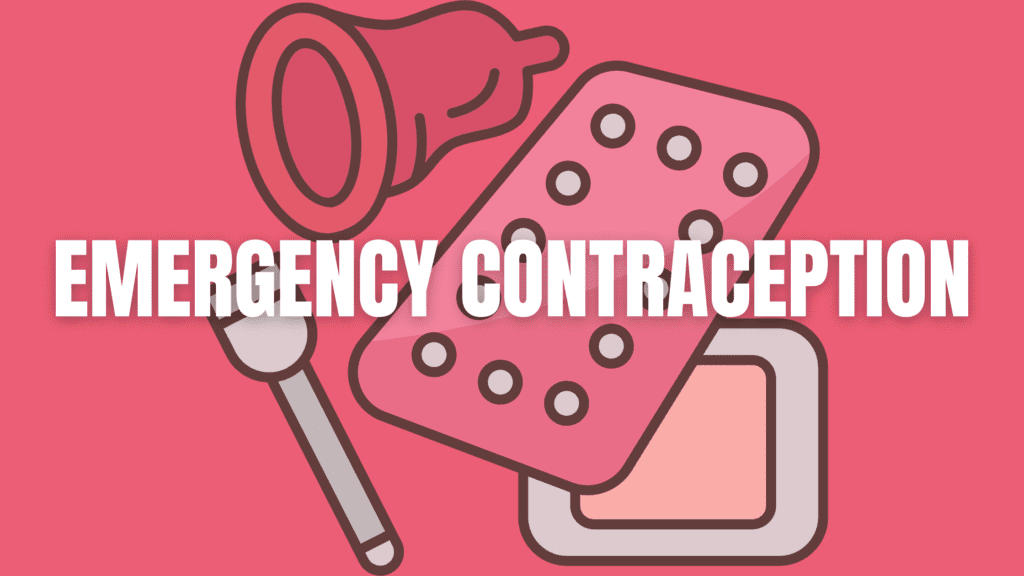Emergency contraception (EC) is a safe and effective way to prevent pregnancy after unprotected sex or contraceptive failure. It’s like a backup plan, not a regular method of birth control, but one that can give you peace of mind in unexpected situations. This blog will explain how emergency contraception works, the types available, and what you need to know to use it effectively.
What Is Emergency Contraception?
Emergency contraception is a method to prevent pregnancy after unprotected sex. It is not an abortion pill and does not harm an existing pregnancy. EC is designed to stop pregnancy from occurring in the first place by interfering with the fertilization process or implantation.
When Should You Use Emergency Contraception?
Emergency contraception can be used in situations like:
- Having unprotected sex.
- Condom breakage or slippage during intercourse.
- Missing regular birth control pills or other contraceptives.
- Experiencing sexual assault.
It’s most effective when taken or used as soon as possible after the event.
Types of Emergency Contraception
There are two main types of emergency contraception:
1. Emergency Contraceptive Pills (ECPs)
ECPs are often referred to as the “morning-after pill.”
How It Works:
- Prevents or delays ovulation, so there is no egg available for sperm to fertilize.
- Alters cervical mucus to make it harder for sperm to reach an egg.
- May prevent fertilized eggs from implanting in the uterus.
Common Brands:
- Levonorgestrel-based pills (e.g., Plan B One-Step): Effective up to 72 hours (3 days) after unprotected sex.
- Ulipristal acetate pills (e.g., Ella): Effective up to 120 hours (5 days) after unprotected sex.
Effectiveness:
- Levonorgestrel pills: About 89% effective when taken within 72 hours.
- Ulipristal acetate: More effective than levonorgestrel, especially on the 4th and 5th days.
Pros:
- Easy to use.
- Widely available (over-the-counter in most places).
Cons:
- May cause side effects like nausea, fatigue, or headaches.
- Less effective for individuals with higher body weight.
2. Copper Intrauterine Device (IUD)
The copper IUD, commonly known as Paragard, is a small, T-shaped device inserted into the uterus by a healthcare provider.
How It Works:
- Copper ions are toxic to sperm, preventing fertilization.
- Alters the uterine lining to stop implantation of a fertilized egg.
Effectiveness:
- Over 99% effective when inserted within 5 days of unprotected sex.
Pros:
- Provides long-term contraception (up to 10 years).
- Most effective form of emergency contraception.
Cons:
- Requires a visit to a healthcare provider.
- May cause cramps or heavier periods initially.
How Does Emergency Contraception Work?
Emergency contraception primarily works by disrupting the process of fertilization and implantation.
- Preventing Ovulation:
ECPs delay the release of an egg from the ovary, ensuring no egg is available for sperm to fertilize. - Blocking Fertilization:
The copper IUD creates a toxic environment for sperm, preventing them from reaching the egg. - Preventing Implantation:
Some ECPs and the copper IUD can alter the uterine lining, making it difficult for a fertilized egg to attach.
When to Take Emergency Contraception?
Timing is crucial for emergency contraception:
- Levonorgestrel Pills: Take within 72 hours for best results.
- Ulipristal Acetate Pills: Take within 120 hours (5 days).
- Copper IUD: Must be inserted within 5 days of unprotected sex.
The sooner you act, the more effective these methods will be.
Myths About Emergency Contraception
Let’s bust some common myths about EC:
- Myth: EC is the same as abortion.
Fact: EC prevents pregnancy and does not terminate an existing one. - Myth: You can only use EC once.
Fact: You can use EC multiple times, but it’s not ideal as a regular method of contraception. - Myth: EC always works.
Fact: EC is not 100% effective, so acting quickly is essential.
Who Can Use Emergency Contraception?
Most people can safely use emergency contraception, including:
- Women of all ages.
- People with irregular periods.
- Those who are breastfeeding (consult a doctor for specific types).
However, individuals with certain medical conditions or those taking specific medications should check with a healthcare provider.
What Are the Side Effects?
Emergency contraception is generally safe but may cause mild side effects, including:
- Nausea or vomiting.
- Fatigue.
- Dizziness or headaches.
- Irregular bleeding or spotting.
These side effects are temporary and usually resolve within a few days.
Can Emergency Contraception Fail?
Although emergency contraception is highly effective, it’s not foolproof.
- Delays in taking EC can reduce its effectiveness.
- Weight can impact the effectiveness of certain pills.
- If you’re already ovulating, some methods may not work.
If you suspect EC has failed, consult a healthcare provider.
How to Get Emergency Contraception?
- Pills: Available over-the-counter in many pharmacies.
- Copper IUD: Requires an appointment with a healthcare provider.
Always follow instructions and consult a professional for guidance.
Final Thoughts
Emergency contraception is a reliable safety net when regular birth control fails or isn’t used. It works by preventing ovulation, fertilization, or implantation. Acting quickly and understanding your options can make a big difference in preventing an unplanned pregnancy. While EC is a helpful tool, it’s not a substitute for regular contraceptive methods.
FAQs
1. Is emergency contraception safe for teenagers?
Yes, it is safe for people of all ages, including teenagers.
2. Can I take emergency contraception multiple times?
Yes, but it’s better to use a regular contraceptive method for long-term protection.
3. Do I need a prescription for emergency contraception?
In many countries, pills like Plan B are available over-the-counter.
4. Will emergency contraception affect future fertility?
No, EC does not harm your ability to conceive in the future.
5. Can I use emergency contraception as my regular birth control?
No, EC is not designed for regular use and is less effective than other methods.
Take control of your reproductive health and make informed decisions!

